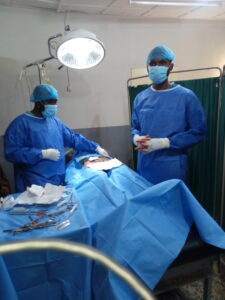Stakeholders have called for free testing and treatment of Viral Hepatitis (VH) in Nigeria by capturing it under the Basic Health Care Provision Fund or the National Health Insurance Act.
The stakeholders made the appeal at a meeting organised by the Federal Ministry of Health (FMoH) in collaboration with the Society for Family Health (SFH), Drug Free and Presentation Healthcare Organisation (DAPHO) and Education As a Vaccine (EVA) through funding support from UNITAID.
Dr Ganiyu Jamiyu, the Deputy Director, Viral Hepatitis Desk, National AIDS and STIs Control Programme (NASCP), FMoH, said Nigeria’s prevalence rate of 8.1 per cent for Hepatitis B Virus (HBV) and 1.1 per cent for Hepatitis C Virus (HCV), was disturbing.
Jamiyu said at the project inception meeting on Hepatitis C Prevention Combination Project (HEPC3P), that situation persists because of limited access to VH services resulting from high cost of testing and treatment.
He said though recent market-shaping efforts yielded 50 per cent significant price reductions of diagnostic and treatment commodities, more still needs to be done as diagnosis and treatment of HBV and HCV is not within the reach of most Nigerians.
Jamiyu said that there should be sustained advocacy for more funding of VH control programmes and increased awareness through sustainable mass media and community campaigns.
“Scale up VH screening among key population and hard to reach areas in states and strengthening of referral system for VH patients.”
He said efforts by the Federal Government to scale up response to the disease included the establishment of the National VH Control Programme in 2013, inauguration of the National Technical Working Group (TWG) and the development of a national policy on VH in 2015.
Others are National Programme on Immunisation which started in 2004, injection control and blood safety which ensured that since 2005, Nigeria has routinely screened all donated blood and blood products for HBV and HCV.
“Injection safety policy including universal precaution existed since 2007 and is implemented in most government facilities.
“Establishment of the National Blood Service Commission (NBSC) to coordinate, regulate and ensure the provision of quality blood, blood products and services (2021),” he added.
The National Coordinator of NASCP, Dr Adebobola Bashorun, said that VH means infective hepatitis that is transmitted through viruses and that about 19 million Nigerians were living with both diseases.
He said there were different VH but the key ones are hepatitis B, C and E viruses.
According to him, Nigeria has a national programme that is looking at every VH infection.
“So in that national programme, which started about 10 years ago, we have a national guideline that tells us what we should do in terms of prevention, treatments and immunisations because it is an immunisation preventable disease, especially hepatitis B.
“So hepatitis C can be treated and that is a plus while the others cannot be treated but be controlled and managed so the country sees treatment as a priority for those that have been infected while we still try very hard to prevent people from getting infected.
“As a country we have a robust guideline that starts from control in the population, prevention so that people can’t be affected, tests for infected persons and treatments for hepatitis C which can be cured.”
Bashorun added that the viruses are blood related infections through either sharing of needle or sexual practices.
Dr Oluwafunke Odunlade, the Technical Officer of HIV and VH, World Health Organisation (WHO) Country Office in Nigeria, said that the meeting was to chart ways to prevent hepatitis C among people who inject drugs.
She said the advocacies and implementation of programmes target different populations as vaccination focuses on prevention in children while some others focus on managing or treating the diseases for older populations.
“We are addressing different populations to ensure that we work on what affects them most, that is why the focus for viral hepatitis B prevention is on children.
“Now for People Who Inject Drugs (PWID), the practice of injection drugs, they exchange needles and HVC is common amongst them.
“That is why what we are doing today is to address HVC among them.
“Thankfully, it is a population group that you can contain in the sense that you can map them, you know the PWIDs and they are not as large as the general population that is why we are working with them,” she said.
Odunlade said that a lot was being done on blood transfusion, adding that hospitals are mandated to ensure that blood for transfusion is screened for Hepatitis B and C, HIV and some other diseases.
She, however, said that the challenge being experienced with hepatitis was diagnostics and treatments because they are quite expensive.
“Most of our health services are being provided for out-of-pocket. If we go to the hospital, we pay even if we have health insurance, but basically, it is still out-of-pocket.
“So it is expensive to get diagnosis and to have the different tests that you need to do, you would be needing up to N50,000.
“So this is where the challenges are but the country is not resting on its oars as the Federal Government is working together with the various stakeholders to address this particular area,” she added.
The Practice Lead, Society for Family Health (SFH), Mr Godpower Omoregie, explained that the meeting was aimed at soliciting for support from the national and state actors for an enabling environment for protocol development and the overall project implementation.
He added that it is to catalyse and enhance the visibility of the national response to VH and facilitate an active sense of ownership by the government for its sustainability beyond the project implementation.
He also said the meeting would provide a national platform for initiating active and ongoing engagement between implementing partners, community members and other stakeholders.
The News Agency of Nigeria (NAN) reports that a 25-member committee was inaugurated at the meeting as the National Community Advisory Board (CAB) on HEPC3P with Dr Bashorun of NASCP as the chairman.



